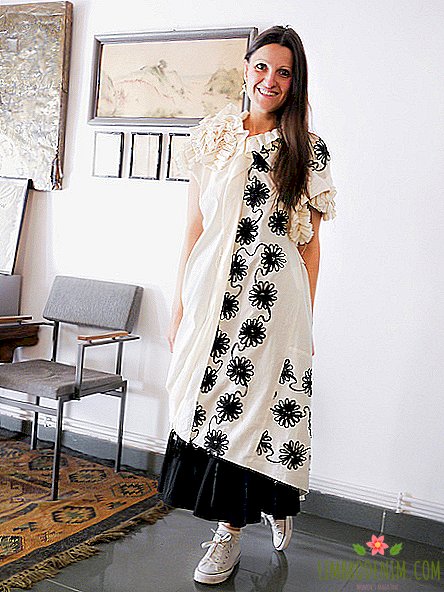From girl to lady: Why is it impossible to turn to a woman neutral
In one of the first episodes of the HBO series "Girls" the heroines discuss the listen-a-book "Listen Ladies: A Tough Love Approach to the Tough Game of Love," the author of which appeals to the readers of "ladies," that is, "lady." "My question is - who are the ladies?" says Hannah. "Of course, the lady is us," Shoshanna answers. “I'm not a lady,” Jess retorts sharply. “You can't make me be a lady.” The series went on the air in 2012, but since then little has changed - it seems that there is still no single message to women that would suit everyone, in many languages. Most of the words that seem neutral to us, on closer inspection, carry the trail of sexist associations behind them - at least because they are never used for men or because their "male" counterparts are overgrown with other meanings.

ALEXANDRA SAVINA

One of the most famous hypotheses of linguistics is the Sapir-Whorf hypothesis: if simplified, it assumes that language influences how its speakers perceive the world. This view is not shared by everyone, but it is impossible to completely deny the connection between language and consciousness. In particular, if inequality is alive, it can also be reproduced in language.
Those who speak Russian, come across this regularly - it’s enough to remember that there is no generally accepted neutral way to speak to a woman in the language. Historically, this was a difficult question - for example, there was a "madam" / "sir" and "madam" / "mister", but it is difficult to call them truly universal - they meant a person of a certain status and position. In Soviet times, the single word “comrade” appeared for all, but for obvious reasons, after the collapse of the USSR, it died out. Since then, native speakers have been trying to find its neutral counterpart, but it seems that so far this has not been possible.
"Woman", "girl", "young lady", "mistress", "citizen", "grandmother" - all these words are endowed with additional meanings. Even if they look neutral on paper, they can acquire a completely non-neutral meaning in speech - from a “young lady”, meaning “effeminateness,” to a “citizen,” which gives a coarse intonation to the speaker. Philologist Maria Tikhonova considers the word “woman” to be the most stylistically and neutrally neutral. In addressing the issue, she proposes to focus on the explanatory dictionary of the Russian language, where the word is fixed, without a litter like "colloquial" or "derogatory", which would indicate to us additional meanings. “If you are approached in a queue by a woman, from the point of view of language and style this is absolutely normal,” Tikhonova said. “Another thing is that any word, even with the most positive connotation, can be pronounced so that it will be unpleasant for a person (and by the way it doesn't matter if it is a man or a woman.) Therefore, you should always be aware that not only what you say is important, but how you say it. "
In the word "lady" Lakoff sees a manifestation of sexism: at first glance, it seems simple politeness, but on closer examination it creates the image of a defenseless woman
But the use of the word "woman" has its own but. For example, it is often used in the hierarchy with the word "girl", distinguishing between "women" and "girls" by age, with the latter being separated from the category of women themselves. In a culture oriented towards the fact that a woman must look younger than her age, the appeal “woman” begins to sound at least offensive - it implies a transition to a “different category”. Calling a woman a woman of an older age, you can achieve exactly the opposite effect - instead of respect, it will sound ironic or mocking.
In English, researchers began to ask similar questions as early as the seventies, at the height of the second wave of feminism. Researcher Robin Lakoff in "Language and Woman's Place" discusses how gender inequality manifests itself in speech - including the language used to talk about women. "A man who has emerged from adolescence can hardly be called a boy, except in terms like" going out with boys "(a party with guys), which imply an atmosphere of certain levity and irresponsibility. But women of any age remain" girls ", - Lakoff writes. Such a use of the word “girl” can be a euphemism, just like “lady” is a euphemism: emphasizing the thought of youth, it removes sexual connotations associated with “woman”. " According to Lakoff, the "girl" can be pleasant to women, as it emphasizes the young age, but this is a deceptive feeling: "Focusing on youth, levity and immaturity," girl "causes associations with irresponsibility." Girl "will not be sent to perform the task for" woman "(and for" boy ", too, for that matter, too)".
In the word "lady", which is often synonymous with "woman", Lakoff sees a manifestation of benevolent sexism: at first glance, it seems simple politeness, but on closer examination it creates an image of a defenseless woman who cannot stand up for herself and make decisions on her own. Of course, today these words are trying to rethink, depriving them of their negative connotations, but it is far from final changes. No wonder the phrase "Morning, girls!", Addressed to a journalist for women - members of parliament, sounded inappropriate and familiarly.
This is not the only controversial issue in how language describes women. In many languages, in addition to the words that actually call a woman ("femme", "woman", and so on), there are separate polite addresses, which can vary depending on whether the man or woman is talking. Even if we leave out the question of the binarity of such a model, it is still difficult to call her ideal: unlike the “woman” / “girl” and their analogues in other languages, it simply replaces the age criterion with marital status - and often only with women. For example, in English there are "miss" for unmarried women and "mrs." For those who are married, and also "mister" for any man, regardless of whether he is married or not. Neutral "Ms" is also used today for situations where a woman’s marital status is unknown. True, this system is primarily concerned with official documents and situations.

According to the researcher of the Sociolinguistics Laboratory of the RSUH and the Laboratory of Linguistic Conflictology and Modern Communicative Practices of the National Research University Higher School of Economics Anton Somin, the idea of a woman’s age is partly included in appeals due to her marital status — for example, when the marital status of the interlocutor is unknown; would have turned "Madame", and to a younger one - "Mademoiselle". “In Italy, the former separation of the signora and the signorina by marital status has already become an age. The word signora became just age-neutral polite treatment (although in the third person it is used only to mention older women). Signorina in different regions are used in different ways: in parts of the northern provinces, it almost completely disappeared, in other regions only the girls are treated this way or, more rarely and usually in the speech of the elderly, to young girls, ”the expert notes.
Of course, speech is not a frozen construction. In some Western languages today they refuse altogether from appeals related to marital status - this happened, for example, in France, where since 2012 only “Madame” has been used in official documents (and in Switzerland, similar changes occurred even earlier, in the seventies). “In everyday speech, the word“ Mademoiselle ”is still used, but much less than before, and now mainly as an appeal to a very young girl - or if the woman herself asks herself to call it that. Family status does not play a role at all,” says Anton Somin. - A similar story happened in the 1970s with the words "frau" / "fraulein" in German. In Spain, where the initial situation was about the same as in Italy, "senorita" was almost out of use, since for young men of a similar "age" treatment was not - and in the end, because of this inequality, there is no neutral address for everyday speech. "
In addition to cases when society is ready to reject one of the appeals, because it seems outdated and sexist, there are other situations. “For example, in Polish there is no appeal“ to you ”, instead of it the words“ Pan ”and“ Pani ”are used in the third person: instead of“ You go out? ”It will be literally“ Does the lady leave? ” is used as a neutral appeal to a girl regardless of age and status, "explains Somin.
In ideal situations, appeals are not tied to either age or marital status - but if you need to choose between "age" and "family", the first is better than the second.
In Japanese, there is a common neutral polite suffix "-san" to refer to anyone, regardless of gender. At the same time, there are other suffixes in the language that allow to convey the most varied shades of meaning - they can be associated with age, status and relationships between people, say, at work or in school. In Korean, there is also a complex system of addresses - they depend on the gender of the interlocutor, and on the existing relations between them. However, gender neutral polite suffixes “-hcf” and “-nim” (the first less formal than the second) can be used for referrals, which, in turn, can be attached to the name of the interlocutor or, for example, the same position. All this works when the name or position of a person is known in advance - otherwise, if it is necessary to refer directly to the interlocutor, use words marked on the basis of gender and age, as well as a conditional position relative to the speaker. They can be equated to Western versions like "Mr" or "Ms", only in them there is much more diversity because of the combination of various factors.
Sometimes in the language they invent new variants that correspond more to modern realities. In Belarus in the nineties, instead of the disappeared “comrade”, they came up with the new words “spadar” and “spadaryna” as abbreviations from “gaspadar” / “gaspadarya” (now the latter means “owner” / “owner”, but earlier it meant “mister” / ” mrs. ") “This word has surprisingly taken root (quite a rare case), but this is probably due to the fact that very few people use the literary Belarusian language in everyday life, and in a small group the new word has much more chances to survive,” explains Anton Somin .
According to the expert, in ideal situations in the language there are appeals that are not tied to either age or marital status - but if you need to choose between "age" and "family", the first is better than the second. “The latter is a much more personal sphere, especially in modern society, where the official fixing of marriage is no longer perceived as something that goes without saying for people in relationships. The age is still more or less obvious from the outside, although, of course, there’s no way from the permanent solution of the dilemma, who is already strange to call a girl, and who would be offended if called a woman. "
Of course, examples from other languages, even the most successful ones, cannot simply be transferred to Russian - for this, at least, it is necessary that people speaking it see the significance of a specific word and want to use this particular option. But the processes occurring in Russian and in other languages help us to notice the inequality - after all, if a woman cannot even speak with a neutral woman, then there can be a lack of partnership in what she is trying to say.
PHOTO: PatchYaLater, Etsy





